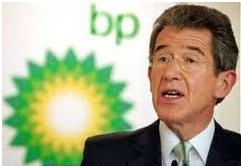|
 |
|
 |
John Browne Leadership
John Browne (1948- )
Highly successful chief executive of the British oil company, BP, 1991-2007 (pictured right). He was criticized for poor safety standards that led to a fire at its American Texas City refinery in 2005, killing 15 people.
Why was he a successful leader at BP?
1. Purpose His aim was to satisfy the needs of BP’s customers. He believes that business success requires:
2. Focusing on the future His Romanian mother taught him to:
He was constantly looking for new and better strategies for BP, like turning it into a green energy company. He was the first boss or an oil company to accept its contribution to climate change, and did something about it with BP’s slogan “beyond petroleum”, investing heavily in alternative energies and fuels like ethanol and wind and solar power.
3. Motivator He inspired his employees to do great things- how?
a) objectives Giving them clear, simple but challenging aims.
b) his example of excellence He was totally dedicated to BP (having never married) and had very high standards.
c) empowering people He gave employees, and BP’s businesses (like exploration), responsibility for achieving their objectives. Anyone who couldn’t achieve them had to tell him or another top manager immediately. His rule was “no surprises”.
d) support and learning He was a great believer in teams where managers and employees meet regularly to:
His rule was: “if you’re in trouble, ask for help”.
4. Learning He made BP into a learning organization in which everyone is learning and improving. He particularly learned from the failure of BP’s autocratic chief executive, Bob Horton (pictured right), and the success of Horton’s democratic and likeable successor, David Simon (pictured right below), . But he failed to learn from a big fire at BP’s Grangemouth refinery in Scotland in 2000, which led to the
disastrous explosion at Texas City in 2005.
5. Distinctiveness He always wanted BP to be a “distinctive company”, i.e. do things better than its competitors, particularly in its main businesses, oil and gas. He reduced BP's dependence on its gas and oil fields in Alaska, the North Sea and the Middle East by expanding into Russia, the Gulf of Mexico and Angola. He made BP into an international company, which was successful worldwide. So he changed its name from British Petroleum to BP.
6. Intelligent and cost conscious He’s got a great brain for finance and finding the cheapest way to discover oil and gas. His rule was “never spend money you don’t have”. He paid close attention to relevant detail, because he realized the difference between success and failure is so small. His training and experience as an engineer (he studied physics at Cambridge University, pictured right) was also extremely useful.
7. Clear communicator He told people clearly and concisely what they needed to do. He writes using a fountain pen, because it’s relatively difficult and so makes him more economical with words.
8. Lover of change and improvement He loved change and realized that BP had to quickly adapt to changing circumstances. He inspired his employees to change, too, so that BP could keep on improving.
9. Work and relaxation Apart from his love of cigars, poetry and the arts, he is a workaholic who often starts work at 4 a.m.!
10. Luck He benefited from rapidly rising oil and gas prices.
11. Toughness He was very tough, firing to either cut costs or punish poor performance. He demanded maximum effort from everyone and closely reviewed the performance of BP’s major businesses every month in a 3½ hour session.
Key quote on organizational objectives The purpose of business is to satisfy human needs.
Key quote on corporate social responsibility A good, successful business is part of society and exists to meet society’s needs.
Key quote on motivation Real productivity comes from the combination of experience and imagination. |
|
|
||
|
|
|
||
|
||
| Copyright © wisdomtowin.com All Rights Reserved | ||
|






